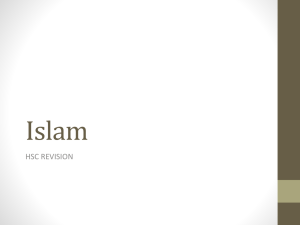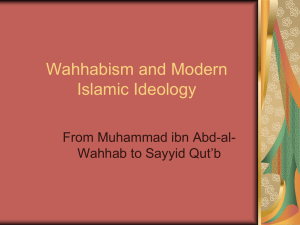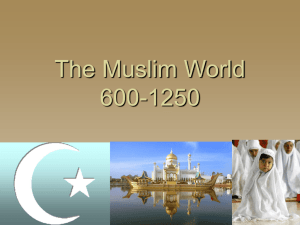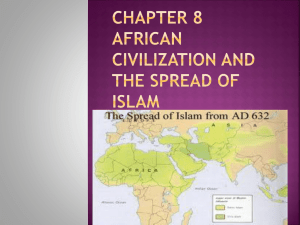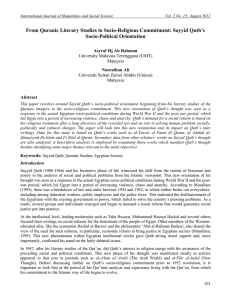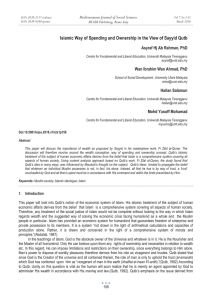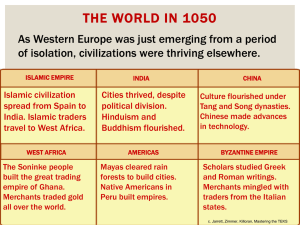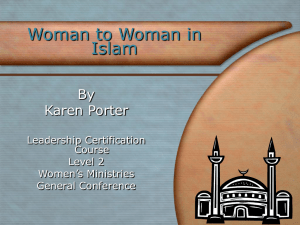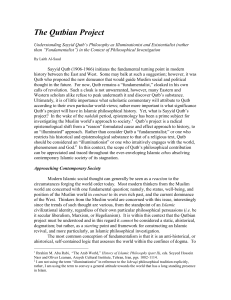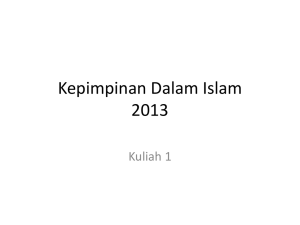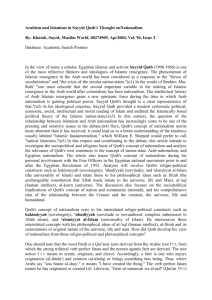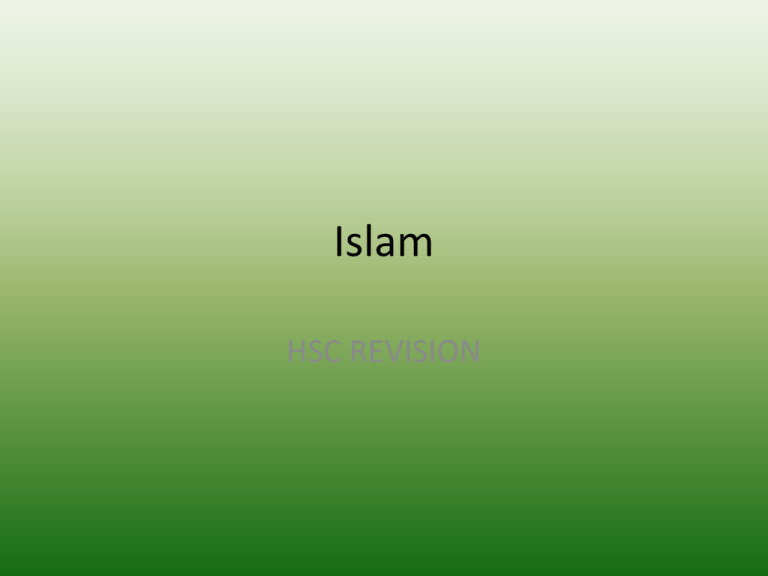
Islam
HSC REVISION
Sayyid Qutb: Contributions
• His Writings (give context! When were they
written? What are they about? What was
happening in his life at the time?)
– Social Justice in Islam
– In the Shade of the Qur’an – Milestones or Signposts
• His position as editor of the Muslim
Brotherhood newsletter
Qutb’s Contributions:
• He reintroduced/reinterpreted a number of Islamic concepts
• Jahiliyyah – pre-Islamic ignorance; people didn’t know what God’s
will was until Muhammad brought them the Qur’an. Qutb wrote
that Jahiliyyah refers to ANYBODY who is not Muslim (by his own
definition), and he also attached the idea that these people were
BARBARIC.
• Salafism – going back to the earliest days of Islam, under the Four
Rightly Guided Caliphs. Salafists believe that the earliest Muslims
were the most perfect and pious
• Jihad – “Struggle/strive against evil”. In Islam, the GREATER JIHAD
(internal struggle) is the most important, followed by the LESSER
JIHAD (physical struggle). Qutb, however, stated that physical action
had to take place (as part of his vanguard for an Islamic revolution).
Qutb’s Contributions:
• Takfir – Qutb had a very clear definition of “Muslim”. Anybody, even
Muslims, who were different to this idea were “excommunicated”.
• Nizam Islami – true Muslim
• Nizam Jahi – false Muslim, affected by “Jahiliyyah”
• Shari’ah – The law of Islam, i.e. God’s will, as determined through
Islamic Jurisprudence. Qutb argued that Shari’ah was the ONLY
truly Islamic way to govern any society/nation. Qutb argued against
secular governments because, he said, they remove the power
from God and give it to people.
• Tawhid – Qutb’s most central idea, also the central idea in all of
Islam. There is ONLY ONE GOD and, so, all things will be at peace if
they submit to the One God.
• Vanguard – Qutb called for a vanguard to eventually start an Islamic
Revolution.
Qutb’s Contributions:
• REMEMBER
– DEVELOPMENT = the ideas/theology/growth
behind the tradition of Islam
– EXPRESSION = the way the tradition of Islam is
practiced
– IMPACT/EFFECT = what happened to Islam as a
result of the contributions? Short & long term?
Qutb’s Impact:
• Qutb had a LIMITED effect on Islam:
– Only a small section of Islam was directly effected
by Qutb’s ideas: Islamist groups.
– The majority of Islam was indirectly effected
because Qutb was offering a new interpretation –
the rest of Islam would have to reaffirm the more
widely accepted understandings of Islam.
Qutb’s Impact:
• Short Term:
– He influenced the Muslim Brotherhood to rebel against the West, specifically
the Western-backed Nasser Government of Egypt
– During his life, Qutb’s contributions had a limited impact, directly on those
members of the Muslim Brotherhood who were given new understanding of
their Islamic faith through Qutb’s writings. The majority of other Muslims in
the world were unaffected, and Islam as a whole tradition did not change
significantly.
• Long Term:
– Years after Qutb’s death, his writings are still being used by Islamist groups,
and his ideas on jihad, jahiliyya, tawhid, etc, are also the focus of many of
these groups.
– Islam as a whole tradition, however, has not been impacted in a large way by
Qutb’s contributions, however moderate Muslim scholars (ulama) continue to
make more sense of the Qur’an and their faith in ways significantly different to
Qutb’s interpretations.
Quotes from Qutb’s writings:
•
“Mankind today is on the brink of a precipice… because humanity is devoid of
those vital values which are necessary not only for its healthy development but for
its real progress… It is essential for mankind to have new leadership!”
– Qutb says humanity needs new leadership based on God’s will (Shari’ah)
– This quote demonstrates his call for an Islamic revolution
•
“Only Islamic values and morals, teachings and safeguards, are worthy of
mankind… Islamic society is truly civilised”
– For Qutb, Islam is the only true system to live in peace in the world
•
“Jahiliyya… takes the form of claiming the right to create values, to legislate rules
of collective behaviour, and to choose any way of life that rests with me, without
regard to what God has prescribed”
– Qutb defines jahiliyya
•
“How must the Islamic resurrection begin? A vanguard must resolve to set it in
motion in the midst of jahiliyyah that now reigns over the entire earth”
– A call for a vanguard of Islamic revolutionaries
Sexual Ethics
• Always Remember:
– You MUST show an understanding of the Ethical
System (i.e. Islamic Jurisprudence)
•
•
•
•
•
SUNNI
Qur’an
Hadith
Ijma’
Qiyas
SHI’ITE
Qur’an
Hadith
Ayatollah
– All these steps are taken to determine Shari’ah
Sexual Ethics
• The ultimate purpose in Islam is to submit to the will of
the one God (Allah). SO, the ethical teachings
determine actions which are:
– Halal (permitted by God)
•
•
•
•
Fard (obligations)
Mustahab (highly recommended)
Mubah (neutral)
Makrah (highly discouraged)
– Haraam (forbidden by God)
• Also remember that family is fundamentally important
in Islam, so teachings on sexuality are often linked with
the concept of family.
Sexual Ethics
• Contraception
• Homosexuality
• Sex outside of marriage
• Are there any differences amongst Muslim
variants?
Hajj
• Describe the Hajj
– Step-by-step description of each day
– Give specific terminology, e.g.:
•
•
•
•
•
Tawaf (circling the Ka’bah)
Ihram (white clothing/state of mind)
Wuquf (Stand before Allah – on the Mount of Mercy)
Umma (worldwide Islamic community)
etc.
Hajj
• Principal Beliefs expressed in Hajj
• Be really specific about the beliefs expressed
in Hajj, e.g.:
– Tawaf reflects Tawhid – the Umma acts as one in
completely submitting to Allah’s will
– Wuquf reflects Akhira – Muslims be God for
forgiveness in the hope that they may reach
Paradise (Janna) when they die
Hajj
• Significance to the Individual & Community
• Once again, give specific examples from the Hajj, e.g.:
– Individual: Wuquf is the most significant part of the Hajj
for individuals. They experience a “re-birth” or renewal of
spirit. Many pilgrims are deeply moved and experience
strong emotions
– Community: Hajj is significant for the Umma. All men are
expected to wear only the Ihram as a sign of complete
equality in God’s eyes. So, rich and poor men from any
nation are equals on the Hajj. This builds a very strong
sense of community amongst groups of pilgrims

